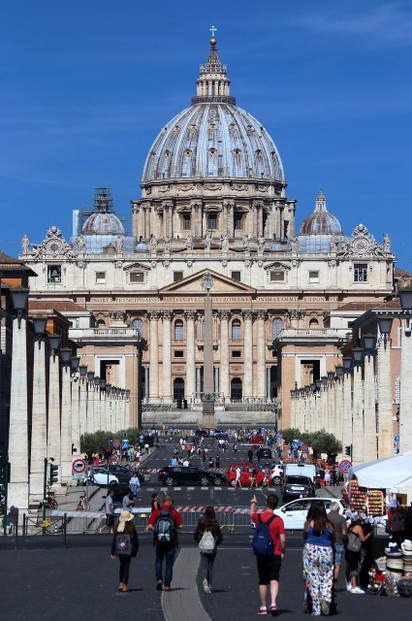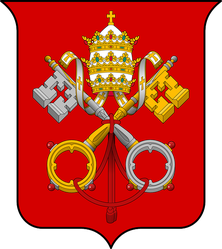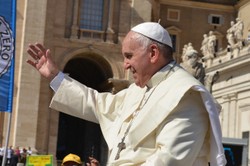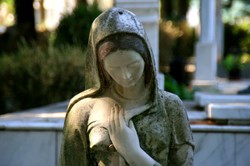The film begins with Cardinal Lawrence, the Dean of Cardinals, walking purposively to the papal apartments to perform his duty of examining the dead pope's body. Fiennes fills the role very well and is a very believable character. The film is here getting to a good start, for it shows the procedures that are followed at the pope's death, all of which show that the film is well researched. I believe that the film presents the Vatican in a balanced way, being alert to the problems faced by the church, which inevitably surface at Conclaves without focusing excessively on any one of them.
There are four cardinals other than Cardinal Lawrence who are significant in this film. There is an̈ Italian traditionalist, Cardinal Tedesco, who shows his theological colours by arriving cloaked in red, a sign of his commitment to traditional ways such as the Latin mass, known as the Tridentine rite, There is an African Cardinal, Cardinal Adeyemi, who is a favourite in the church's desire to honour Africa with a black pope, and a Canadian , Cardinal Tremblay, who is deemed very likely to get the papacy. A fourth, Cardinal Bellini, an Italian is a reformer, a stout foe of the traditionalist,
A surprise arrival is a relatively young, unknown Cardinal, Cardinal Benitez, who was the archbishop of Kabul. He has been secretly made a cardinal "in pectore", which means "in the breast" a technique for appointing someone who is the cardinal for an area where the church is heavily persecuted, as it is under the control of Muslim extremists. The man has extensive experience as a missionary. A good. candidate, but somewhat different. Cardinal Lawrence, as Dean of Cardinals, has to decide whether to accept the newcomer. He does so, and the consequences are significant..
The nuns play their part. They do the domestic arrangements, feeding the Cardinals and cleaning their accommodation. The nuns are not brokers in the male cardinals' machinations, but quietly get on with their duties. This is realistic, for in the recent scandals that have beset the church not many women have been culprits, as opposed to males, who form the bulk of the miscreants








 TheThousand Year Gardenon 11/26/2025
TheThousand Year Gardenon 11/26/2025
 Women of the Gospelson 10/11/2025
Women of the Gospelson 10/11/2025
 Religious Gardenson 08/25/2025
Religious Gardenson 08/25/2025
 Doctor of the Church: John Henry Newmanon 08/03/2025
Doctor of the Church: John Henry Newmanon 08/03/2025



Comments
I have yet to hear of the medicInes that you. have just mentioned.
Thank you for your comment below, in answer to my previous observation and question.
There's a Unitedstatesian tendency toward ciprofloxacin instead of penicillin and toward prednisone for many allergic, inflammatory and other reactions. Is that the tendency in the UK?
In the UK patients do not have the right to request that they be treated by a person of the religion. There is no right to ask for someone of a belief system of your own. The professionalism of the medical staff is assumed, and therefore it is assumed that service will be given impartially.o
Thank you for your comment below in answer to my previous observation and question.
One time at the emergency and walk-in clinic the patient-to-be sheet asked if I appreciate a certain religion of the medical staff to attend me.
I indicated Catholic. The able, amiable, astute attending Catholic female doctor informed me of a prednisone shot or a steroid shot against my incredible poison-ivy allergic reaction. She also listed tub soaks as leading the urushiol from sub- to surface-skin and therefore to shorter reaction times.
The two subsequent times the intake form lacked that religious-preference question.
Might you as an ambulatory, walk-in walk-out patient or as a hospital-admitted patient be able to mention a preferred-religion choice such as my one experience above?
The religion of the chaplain clearly matters,but the religion of attending staff is not deemed significant
Some early 21st-century emergency clinics -- perhaps in case of someone dying -- asked on the form if the patient-to-be considered a particular religion of the attending medical staff.
Is it possible within United-Kingdom, Italian, European-Union health systems to indicate a preferred religion of the attending staff?
I am unsure of the Vatican medical arrangements on health care, but I suspect that they tie in with the Italian system.
Conclave is among what the library system lists as "hot flicks," new movies with a four-day circulation time, as opposed to the thrice-renewable 7-day regular -- not new releases -- films.
The week before last it made its way back from quite a long list of patron check-outs.
So I picked it up, saw it and was impressed with the strong characters and plot.
The unexpectedly special anatomy of Cardinal Benitez started me thinking about medical care and insurance.
Would everyone in the Vatican and in Vatican City have access to a certain set of medical insurance and specialists or would the Pope have his own?
The Vat8can, to my knowl3dge, has never produced or sponsored a film of the character that you identify.
Your last paragraph advises us that "I found this film to be thoroughly enjoyable, and at times in the future I will watch it again. The film addresses some of the issues affecting the Roman Catholic Church, but it approaches them with wisdom and an open mind. The characters are well-imagined and are all believable. I would recommend this film to all readers."
Is there such a thing as a Vatican-ideated, Vatican-involved film -- undoubtedly documentary ;-D -- about papal conclaves?